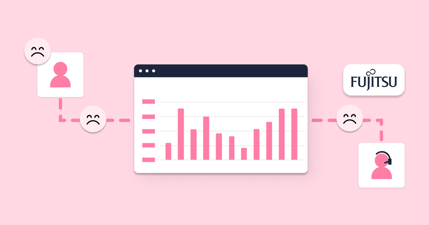8 Reasons Why the Belief That Employee Experience Doesn’t Matter to MSPs is Flawed
We're seeing more and more conversation around how 'employee experience isn’t relevant to MSPs.' But this assumption is wrong! And in this blog, I tell you why, looking specifically at eight flawed beliefs in this area.

For a managed service provider (MSP) doing its best to serve its clients, the topic of employee experience might not resonate as much as customer retention, margins, and profitability. After all, the end-users it serves and supports aren’t its own employees; they are its clients’ employees. So, employee experience isn’t relevant to MSPs, right?
Sadly, this is a flawed assumption or belief (with this explained below), and it’s just one of many misinformed beliefs people might have when it comes to experience management in the context of the MSP operating model. Please keep reading to find out more, with this blog sharing the first set of flawed MSP employee-experience beliefs before I cover another set in my next one.
Flawed belief #1: Employee experience is only about happy end-users
This incorrect assumption is a good place to start – because the belief that employee experience is only about employee happiness is relevant to all organizations, not just MSPs. Hence, it also brings in the perspective of MSP clients (that’s covered later too).
The easiest way to dispel this belief is to ask your employees “what matters most” to them. They will likely not say their happiness at work but something else, and we all have our own perspectives. Although, these responses are probably the root causes that collectively contribute to our happiness at work. For example, Forrester Research launched its employee experience focus in 2019 with a blog stating, “Psychological research shows that the most important factor for employee experience is being able to make progress every day toward the work that they believe is most important. But when presented with this option, managers will consistently rank it dead last. Clearly, we have a gap.”
Making employee productivity a key element of employee experience and something that organizations should focus on to improve business operations and outcomes. Fast forward to the end of 2021, and Forrester Research boldly upped the stakes with a blog titled “Predictions 2022: 2022 Will Go Down As The Year Executives Were Forced To Care About Employee Experience.”
How IT service delivery and support capabilities help or hinder employee productivity also has a knock-on effect on employees. For example, 2022 research by Freshworks found that “nearly half (49%) of employees surveyed report that inadequate workplace technology causes them to feel stressed and 48% claim it has negatively impacted their mental health.”
Clearly, employee experience is about more than happy end-users.
Flawed belief #2: Employee experience reduces margins and profitability
The focus on employee experience improvement doesn’t come for free. It requires investments to identify, consider, and action improvement opportunities, which might increase operational costs. Hence, it’s understandable that focusing on employee experience might be viewed as reducing MSP margins and profitability.
However, this is a compartmentalized view of the change that can be countered by taking a value-based view. This view is similar to that of another MSP essential – IT management or IT service management (ITSM) tools. On the one hand, a tool is an additional cost that (when considered in isolation) reduces margins and profitability. However, using the tool (or predicted use) brings many benefits that outweigh the associated costs. There are operational improvements that save money and capabilities that are attractive to new clients and help to retain existing clients. The same is true with experience management. There are benefits related to operational and service improvements as well as the ability to win and retain business. Especially as clients increasingly understand the need for delivering better employee experiences and mandate that their MSP has an experience focus.
Flawed belief #3: Clients aren’t interested in the employee experience from their MSP
This belief follows on nicely from #2. Even if an organization doesn’t employ MSP services, how likely are they to invest in employee experience in the future? Early 2022 ITSM Benchmarking research by AXELOS and ITSM.tools found that two-thirds of IT organizations already understood the need to deliver a better employee experience, with another 18% expecting to in 2022. Only 9% of respondents thought their organizations would never see the need.
While there’s a significant difference between knowing something needs doing and acting on the knowledge, who would bet that, with such high levels of interest, the need for employee experience improvement doesn’t become a key factor for IT success and for MSP engagements as a result?
Flawed belief #4: MSPs can’t easily implement and benefit from experience management practices
On the one hand, experience management isn’t something that can just be “switched on.” Instead, it’s a journey that takes a year or longer to really bed into IT operations and culture. But it’s a worthwhile investment, and many MSPs have already taken this journey with us and have seen the benefits of experience management.
The Global IT Experience Benchmark: H2/2021 Report shares data on this, including that while outsourced services desks still lag behind internal service desks, in experience score terms, they are better at driving employee experience improvements. The chart below shows this.
So, while the belief that the implementation of experience management practices isn’t easy isn’t entirely flawed, the belief that it’s hard for MSPs is. MSPs are better positioned to drive the experience-based change needed to better meet client needs.
Flawed belief #5: Client end-users expect less from MSPs
It almost feels silly to include this assumption. While client employees might know that some IT services have been outsourced, they just expect their IT to work when needed. Also, client employees probably don’t look behind the service provider “curtain” to see who is providing their IT services and support; they are just concerned with whether their IT is working well or not. Although people being people, your MSP might get blamed for IT services failing to meet employee expectations (and needs) even when it’s not its fault.
One could argue that client employees, if they know certain IT services are outsourced, actually expect more based on MSP contractual promises of higher service levels and increased innovation. Especially if these promises have been “sold” to client employees as part of the organizational change management approach to the (insourcing to outsourcing) change. Plus, client-employee expectations are likely still rising based on their superior consumer-world service and support experiences. These expectations were probably magnified by employees moving to remote working, which increased the criticality of IT service effectiveness to employee productivity (both IT service delivery and support).
Hence, the assumption that client end-users expect less from MSPs is flawed.
Flawed belief #6: Employee experience isn’t an MSP market differentiator
There are two ways to examine this assumption’s validity – the MSP view, where an MSP looks at ways to create differentiators versus competitors, and the client view. It’s the latter of these that can best dispel this false belief.
The assumption is valid if clients and potential clients aren’t looking for their current or next MSP to demonstrate a focus on employee experience. However, if clients and potential clients are increasingly demanding that their current or next MSP can show a focus on employee experience, then experience management is a differentiator. At least in the short term, until experience-focus parity among MSPs means that it’s no longer a differentiator and is instead “table stakes” for any MSP wanting to retain and win new business.
Flawed belief #7: Clients only want lower IT service delivery and support costs
When clients engage a new MSP, they might want to lower their IT service delivery and support costs, but is this all they want? Or is the promise of better capabilities – based on best practice capabilities (across people, process, and technology) and innovation over the contract’s life – also important?
Very few (successful) MSPs think that lower costs, while important, are the only outcome clients want from engaging an MSP. Additionally, the growing enterprise interest in employee experience and the insight into the negative impact of poor IT experiences on employee productivity are also changing their view of IT costs. In particular, in the context of IT support costs – where a dollar saved in support might cost the business $10 as service desk analysts or automation fail to return employees to productivity quickly.
Flawed belief #8: Employee experience doesn’t matter to MSPs
While this is the primary flawed assumption addressed in this blog, it has been deliberately left until the end – because all of the above points contribute to explaining why employee experience does matter to MSPs.
The same will be true in the second part of this blog which will again look at a range of flawed beliefs related to MSPs and employee experience. This will include assumptions around working together, performance measurement, and technology.
How to use experience data to optimize and manage collaboration with your MSP? See the Demo.
Related content

27.10.2022
6 More Reasons Why the Belief That Employee Experience Doesn’t Matter to MSPs is Flawed
In my previous blog, I challenged eight flawed assumptions or misinformed beliefs that people might have related to ...
Read more >
01.02.2023
MSPs and the Need for Experience Management
Your managed service provider (MSP) might be assessing experience level agreements (XLAs) and employee experience ...
Read more >
